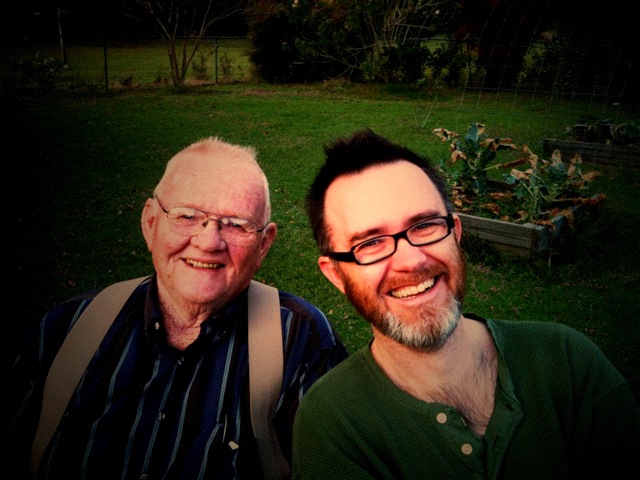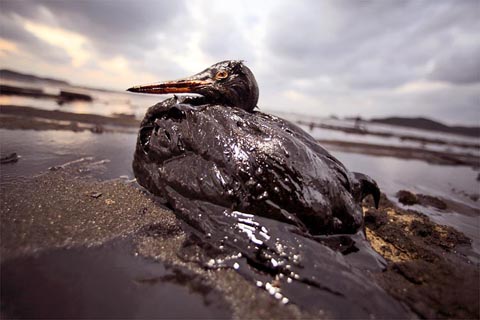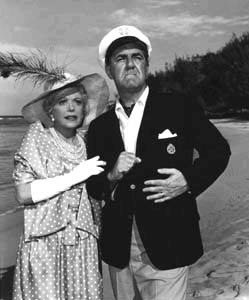
That’s a photo of my father and me taken late last year in his backyard. It’s one of my favorites. How fortunate we are to be here in Starhill to celebrate Father’s Day with him. It gives me the opportunity to bring up here what I think is the best thing I’ve ever written: an essay in tribute to him that I published on Father’s Day weekend 2001 in The Wall Street Journal. Here’s an excerpt:
So that first week after Matthew’s grandparents left, we followed Pawpaw’s adventures hunting squirrels so his family would have enough to eat during the Depression. We joined him in the rodeo, riding bucking bulls and wrassling steers. We followed Pawpaw into the Coast Guard, and rode out a hurricane in Mobile Bay lashed to the wheel of his 40-foot cutter. Then Pawpaw piloted a dinghy in rough seas, outmaneuvering a shark to complete a mission to change a buoy’s light bulb.
Then I told Matthew about the things Pawpaw did when I was little. Once I saw Pawpaw catch an egg-stealing chicken snake by the tail and crack him like a whip, snapping the varmint’s head off. I told my boy about the hunts, when Pawpaw took me into the swamp and showed me how to stalk whitetail bucks and other game. I told him about how when the Mississippi River flooded, Pawpaw would set lines in the backwater for catfish but often snared snapping turtles, alligator gars and fat black water snakes instead.
You can imagine how thrilling this is to a little Brooklyn boy. But the other night, when Matthew’s deep breathing told me he was asleep, it struck me that I hadn’t thought about these things in years. Here I was rediscovering my father’s life through telling stories about him to my own son (a startling number of which end with the cooking and eating of a wild animal). As a child, none of this seemed extraordinary to me at all. It’s how most men lived in West Feliciana Parish, and indeed some version of this rural saga is how a great number of Americans lived until a moment ago.
Truth is, it’s more pleasurable to me in the telling than it was in the living. I was a bookish kid who longed for the big city. Though I idolized my dad for his courage and omnicompetence, I always knew I would find the meaning of my life and vocation elsewhere. But telling these stories to my son about my Southern boyhood, I’m discovering a poetry of place I hadn’t noticed before, or at least resisted.
Admittedly, this is nostalgia for a world that has largely gone. West Feliciana Parish is rapidly becoming a suburb of Baton Rouge, with domiciles for Dixie-fried bobos springing up like mushrooms in erstwhile cow pastures. Cable television monoculture is everywhere, as is the same social breakdown you see in big cities (do you suppose there’s a connection?). Sic transit gloria mundi, y’all.
So why do I keep thinking about the South these days? “Lanterns on the Levee” romanticism has never appealed to me, yet as I think about the childhood my son will have here, I can’t help reconsidering the good in what I rejected.
It bothers me that Matthew won’t have his Pawpaw around to be a friend to him. He won’t have taken in the smell of tobacco, bourbon and dried gumbo mud flaking off hunting boots that is my father’s aroma. He won’t know what it feels like to stand in a duck blind, chilled to the bone and anxious to the fingertips, waiting for the mallards to swoop in.
More important, it troubles me that Matthew won’t have Pawpaw as an example. As a new father, I am grasping for a way to articulate manly virtue for my boy in a way that doesn’t feel phony. It’s impossible to imagine speaking of “manliness” or “virtue” in the world I inhabit now, filled with well-meaning, highly educated men and women who would have to put ironic quotation marks around those words or die of embarrassment.
Am I this way too? I worry about that. My dad never does.
You can read the whole thing on the Journal website, or go below the jump here; I’ve pasted the whole thing in because I’m afraid it’s going to disappear behind a News Corp. pay wall one of these days, and I want the text preserved somewhere.
Just now I read an incredible newspaper tribute by Nicholas Kristof to his father, Ladis Kristof, who died a few days ago, aged 91. If you read nothing else today, make it Kristof’s column. Ladis Kristof, an immigrant, lived a life of incredible hardship and suffering, but also of overcoming and triumph. Excerpt:
Penniless, my father fled on horseback to Romania but saw that a Communist country would afford a future neither for him nor his offspring. So he headed toward the West, swimming across the Danube River on a moonless night. On the Yugoslav side of the river, he was captured and sent to a concentration camp and then an asbestos mine and a logging camp. After two years, he was able to flee to Italy and then to France.
My father found that despite his fluent French and university education, France did not embrace refugees. Even children of refugees were regarded as less than fully French.
So he boarded a ship in 1952 to the United States, the land of opportunity — even though English was not among the seven languages that he spoke. His first purchase was a copy of the Sunday New York Times, with which he began to teach himself an eighth language.
And he lived to see his son become a Pulitzer Prize-winning columnist for that newspaper. What an incredible American story. What an incredible American life the elder Kristof led. You’ve got to read the whole column, to the very end. Please, do this. You won’t regret it.
I’d love to read in the comboxes stories and remembrances you readers have of your fathers.
Pawpaw’s World
What is manly virtue? Are you embarrassed to ask? He doesn’t have to.
by ROD DREHER
Friday, June 15, 2001 12:01 A.M. EDT
At bedtime, as night falls over Brooklyn and my toddler Matthew has said goodnight to Moon for the umpteenth time, I turn off the bedside lamp and tell him it’s time to sleep. Then I turn the light off, he rolls into the crook of my arm, cranes his head so he can whisper in my ear, and says, “Pawpaw.”
This is my cue to tell my 20-month-old son stories of his grandfather, my own dad, who lives with my mom (“Mammy” to Matthew) in Starhill, a south Louisiana enclave where the only sounds at night are crickets and bullfrogs, not sirens on the Brooklyn-Queens Expressway.
Matthew’s grandparents visited a couple of months ago, and he fell hard for them. Especially Pawpaw, who shares the boy’s enthusiasm for graders and forklifts and things that go. After they went home to Starhill, Matthew kept asking for them (“Mammy! Pawpaw! See more!”) and at bedtime wanted me to tell him real-life stories about Pawpaw.
So that first week after Matthew’s grandparents left, we followed Pawpaw’s adventures hunting squirrels so his family would have enough to eat during the Depression. We joined him in the rodeo, riding bucking bulls and wrassling steers. We followed Pawpaw into the Coast Guard, and rode out a hurricane in Mobile Bay lashed to the wheel of his 40-foot cutter. Then Pawpaw piloted a dinghy in rough seas, outmaneuvering a shark to complete a mission to change a buoy’s light bulb.
Then I told Matthew about the things Pawpaw did when I was little. Once I saw Pawpaw catch an egg-stealing chicken snake by the tail and crack him like a whip, snapping the varmint’s head off. I told my boy about the hunts, when Pawpaw took me into the swamp and showed me how to stalk whitetail bucks and other game. I told him about how when the Mississippi River flooded, Pawpaw would set lines in the backwater for catfish but often snared snapping turtles, alligator gars and fat black water snakes instead.
You can imagine how thrilling this is to a little Brooklyn boy. But the other night, when Matthew’s deep breathing told me he was asleep, it struck me that I hadn’t thought about these things in years. Here I was rediscovering my father’s life through telling stories about him to my own son (a startling number of which end with the cooking and eating of a wild animal). As a child, none of this seemed extraordinary to me at all. It’s how most men lived in West Feliciana Parish, and indeed some version of this rural saga is how a great number of Americans lived until a moment ago.
Truth is, it’s more pleasurable to me in the telling than it was in the living. I was a bookish kid who longed for the big city. Though I idolized my dad for his courage and omnicompetence, I always knew I would find the meaning of my life and vocation elsewhere. But telling these stories to my son about my Southern boyhood, I’m discovering a poetry of place I hadn’t noticed before, or at least resisted.
Admittedly, this is nostalgia for a world that has largely gone. West Feliciana Parish is rapidly becoming a suburb of Baton Rouge, with domiciles for Dixie-fried bobos springing up like mushrooms in erstwhile cow pastures. Cable television monoculture is everywhere, as is the same social breakdown you see in big cities (do you suppose there’s a connection?). Sic transit gloria mundi, y’all.
So why do I keep thinking about the South these days? “Lanterns on the Levee” romanticism has never appealed to me, yet as I think about the childhood my son will have here, I can’t help reconsidering the good in what I rejected.
It bothers me that Matthew won’t have his Pawpaw around to be a friend to him. He won’t have taken in the smell of tobacco, bourbon and dried gumbo mud flaking off hunting boots that is my father’s aroma. He won’t know what it feels like to stand in a duck blind, chilled to the bone and anxious to the fingertips, waiting for the mallards to swoop in.
More important, it troubles me that Matthew won’t have Pawpaw as an example. As a new father, I am grasping for a way to articulate manly virtue for my boy in a way that doesn’t feel phony. It’s impossible to imagine speaking of “manliness” or “virtue” in the world I inhabit now, filled with well-meaning, highly educated men and women who would have to put ironic quotation marks around those words or die of embarrassment.
Am I this way too? I worry about that. My dad never does. Those words mean something to him. More Stoic than Christian, in the classic Southern tradition, he is neither a soft man nor a decadent one.
By “soft,” I mean men like–well, men like me, who make our livings from our minds, not our backs, and who are shielded by our very urbanity (or suburbanity) from the rigors of life that rural people cannot avoid. There comes with that hardness a certain realistic moral stance toward the world and what it owes one–and what one owes it.
By “decadent,” I mean ironic detachment and radical doubt masquerading as sophistication, a cast of mind that cannot produce righteousness because it doesn’t believe righteousness exists. As C.S. Lewis said, “We make men without chests and expect of them virtue and enterprise. We laugh at honour and are shocked to find traitors in our midst. We castrate and bid the geldings to be fruitful.”
I am to raise my son in an urban culture dominated–indeed, in my social and professional milieu, overrun–by men without chests. Well, my Louisiana dad has a chest, and the habits of the heart that beats beneath his breastbone are ones I want to instill in my boy.
Matthew will learn what it means to be brave and true from his father, to be sure, but the experience seems attenuated for a city kid. And he will be immersed in a permissive culture that corrodes the moral structure his mother and I will try to build. For all the drawbacks of the rural South, a man can raise a family there knowing the seeds of faith and virtue he plants in his children’s hearts will have a less hostile environment in which to grow.
And there’s one other thing. The other night, as Matthew lay sleeping next to me, I wondered where his life’s journey would take him. Please God, I prayed, never let him live too far from his daddy. Please let me be a part of his life. Then it hit me: That has been my father’s prayer every night since I left home for school 18 years ago, then went on to a career in the East.
“Oh where have you been, my blue-eyed son? Oh where have you been, my darling young one?” I used to hear Bob Dylan sing those mournful lines years ago, while in college. Years later, with my own baby boy nestled in my arms and thoughts of my own faraway father, aging and in declining health, heavy in my heart, I finally knew what they meant.
Mr. Dreher is a columnist for the New York Post and a writer for Touchstone magazine.

